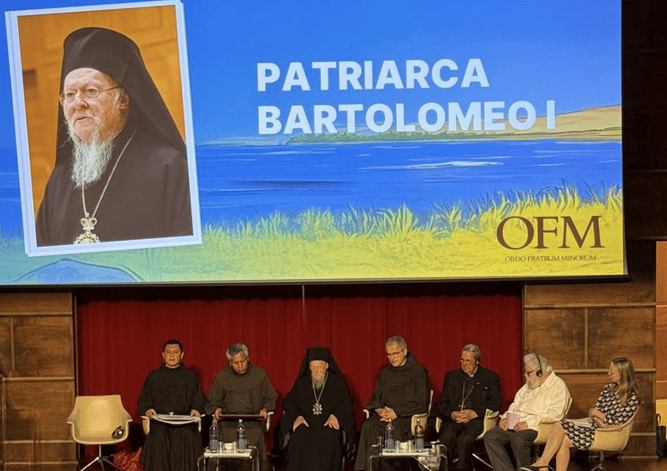The Order of Franciscan Friars Minor (OFM) in collaboration with the Pontifical Antonianum University held the presentation of the Laudato Si’ Awards on May 30, coinciding with the centenary of the Canticle of the Creatures by Saint Francis of Assisi and 10th anniversary of Pope Francis’s encyclical Laudato Si’.
The Laudato Si’ Award recipients were:
-His Beatitude Bartholomew I, Ecumenical Patriarch of Constantinople, for his prophetic voice in favor of the care of creation, as an expression of Christian ecumenism.
-Theologian Leonardo Boff, for his reflection linking social justice with environmental justice.
-The Pan-Amazonian Ecclesial Network (REPAM), represented by its President, Bishop Rafael Cob García, apostolic vicar of Pyuo, Peru, for its defense of the Amazonian peoples and the ancestral wisdom that safeguards the green lungs of the planet.
-The Laudato Si’ Movement, represented by its Executive Director, Fr. Lorna Gold, for transforming Pope Francis’s encyclical into concrete action in communities around the world.
“The awards we are presenting today are not mere recognitions, but symbols of a universal call to ecological conversion,” said the Order’s Minister General, Franciscan Friar Massimo Fusarelli, saying the celebration not only honors two key moments in the history of Franciscan spirituality and the church’s social teaching, but also seeks to recognize individuals and institutions that embody the vision of integral ecology. “Each awardee represents a unique dimension of this commitment.”
Fusarelli also encouraged us to “recognize all of creation as a gift from God and praise it together with all creatures,” saying the current ecological crisis is also a spiritual and anthropological crisis that demands a comprehensive response: conversion of heart, a change of lifestyles, and transformation of social and economic structures.
“Any human action that harms the environment must be considered a grave sin,” said Patriarch Bartholomew I of Constantinople, voicing his conviction that, “without a true conversion of humanity, the ecological problem cannot be resolved.”
“The early church broadly understood the importance of humankind’s relationship with creation and all that it comprises, starting from holy scripture,” Bartholomew said in his speech. However, “throughout history, humanity, and sometimes even churches, have still not yet understood the intrinsic and ever-present relationship between creator, creation, and what is created.”
For Bartholomew, the problem likes “in the current economic orientation, driven by the maximization of profits without allowing nature to regenerate, relegating the protection of our common home to a mere ideologization of ecological movements.”
For his part, the theologian Leonardo Boff said, “the great challenge lies in making that transition from ‘master-owner’ who is above nature and exploits it until he no longer can, to ‘brother and sister’ who treat each other as such.”
In this sense, Bishop Rafael Cob García, who received the REPAM award, encouraged faithful, during the Jubilee Year, to “walk as pilgrims of hope toward that paradise that God promises us.”
Representing the Laudato Si’ Movement, Lorna Gold noted that “the Laudato Si’ Movement is a miracle of the Holy Spirit in the church and in the world today,” acknowledging, in turn, that, “I am not here because of my merits, but because the Spirit has touched the hearts of millions around the world to hear the cry of the earth and the poor.”
“We are facing an ecological turning point that has become a widespread crisis of conscience. Therefore, as a people of faith, we must unite to transform this dark moment into a Kairos,” Gold said.












